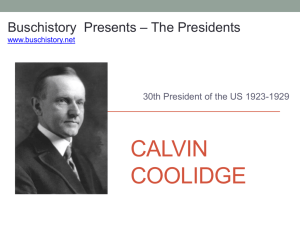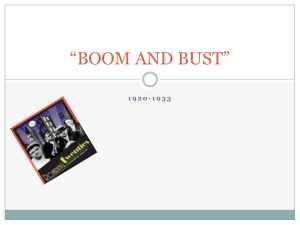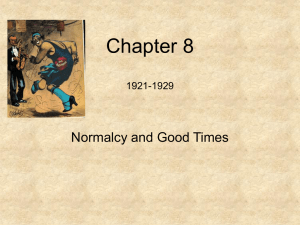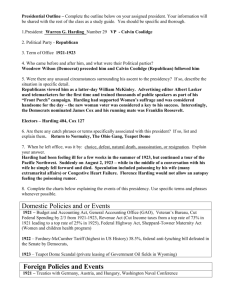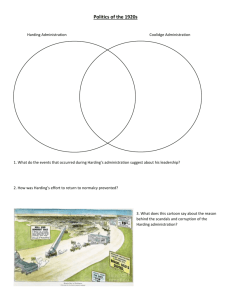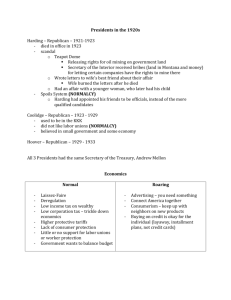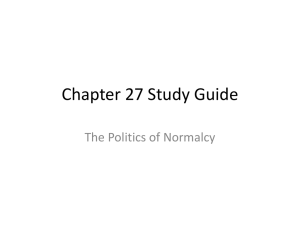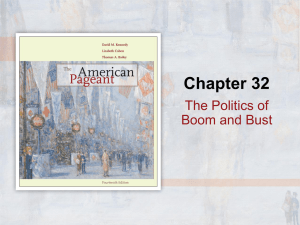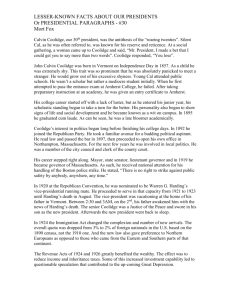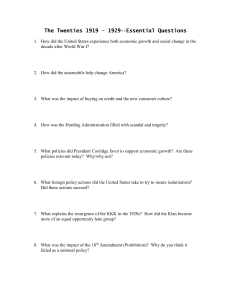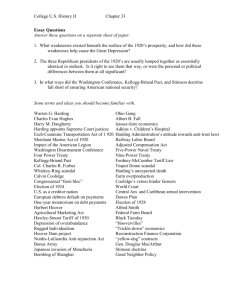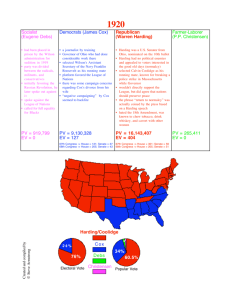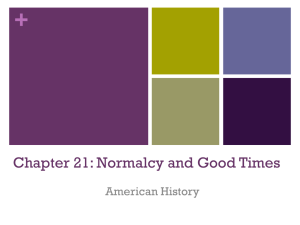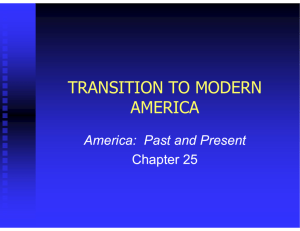File
advertisement
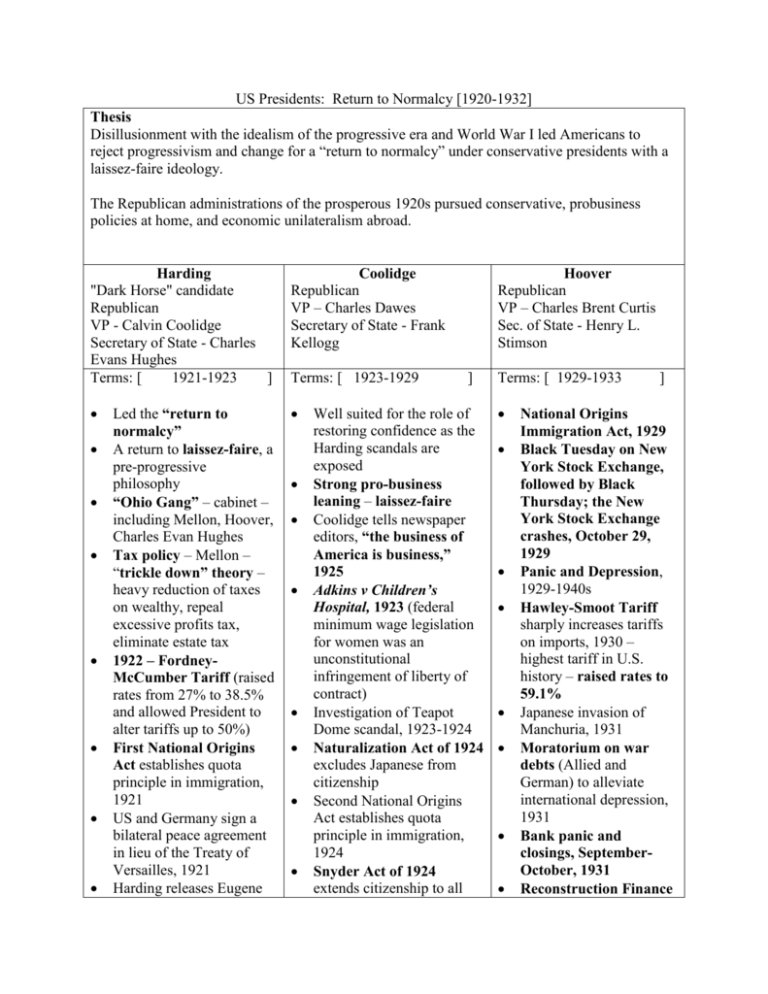
US Presidents: Return to Normalcy [1920-1932] Thesis Disillusionment with the idealism of the progressive era and World War I led Americans to reject progressivism and change for a “return to normalcy” under conservative presidents with a laissez-faire ideology. The Republican administrations of the prosperous 1920s pursued conservative, probusiness policies at home, and economic unilateralism abroad. Harding "Dark Horse" candidate Republican VP - Calvin Coolidge Secretary of State - Charles Evans Hughes Terms: [ 1921-1923 ] Coolidge Republican VP – Charles Dawes Secretary of State - Frank Kellogg Led the “return to normalcy” A return to laissez-faire, a pre-progressive philosophy “Ohio Gang” – cabinet – including Mellon, Hoover, Charles Evan Hughes Tax policy – Mellon – “trickle down” theory – heavy reduction of taxes on wealthy, repeal excessive profits tax, eliminate estate tax 1922 – FordneyMcCumber Tariff (raised rates from 27% to 38.5% and allowed President to alter tariffs up to 50%) First National Origins Act establishes quota principle in immigration, 1921 US and Germany sign a bilateral peace agreement in lieu of the Treaty of Versailles, 1921 Harding releases Eugene Terms: [ 1923-1929 Hoover Republican VP – Charles Brent Curtis Sec. of State - Henry L. Stimson ] Well suited for the role of restoring confidence as the Harding scandals are exposed Strong pro-business leaning – laissez-faire Coolidge tells newspaper editors, “the business of America is business,” 1925 Adkins v Children’s Hospital, 1923 (federal minimum wage legislation for women was an unconstitutional infringement of liberty of contract) Investigation of Teapot Dome scandal, 1923-1924 Naturalization Act of 1924 excludes Japanese from citizenship Second National Origins Act establishes quota principle in immigration, 1924 Snyder Act of 1924 extends citizenship to all Terms: [ 1929-1933 ] National Origins Immigration Act, 1929 Black Tuesday on New York Stock Exchange, followed by Black Thursday; the New York Stock Exchange crashes, October 29, 1929 Panic and Depression, 1929-1940s Hawley-Smoot Tariff sharply increases tariffs on imports, 1930 – highest tariff in U.S. history – raised rates to 59.1% Japanese invasion of Manchuria, 1931 Moratorium on war debts (Allied and German) to alleviate international depression, 1931 Bank panic and closings, SeptemberOctober, 1931 Reconstruction Finance Debs from prison, 1921 (convicted under Espionage Act – arrested in 1918 for denouncing WWI) Veterans’ Bureau established, 1921 Scandals plagued Harding’s presidency, including the Teapot Dome Scandal, 19211923 Washington Conference, 1921-1922 – Washington Naval Treaty disarmament Agricultural depression, 1921-1943 Harding vetoes a veterans’ bonus bill (the differential between their wages and the wages they would have earned had there been no war), 1922 Native Americans Dawes Plan, 1924 World War Adjusted Compensation Act (Soldiers’ Bonus Act) passes over Coolidge’s veto, 1924 Gitlow v New York, 1925 Scopes Trial in Dayton, Tennessee Revenue Act reduces personal income and inheritance taxes, 1926 Eugenics movement affirmed in Buck v Bell, 1927 (ruling that upheld a statute instituting compulsory sterilization of the unfit, including the mentally retarded, "for the protection and health of the state." It was largely seen as an endorsement of negative eugenics—the attempt to improve the human race by eliminating "defectives" from the gene pool.) Execution of Sacco and Vanzetti, 1927 Kellogg-Briand Pact outlaws war as a means to solve international disputes, 1928 Owen Young and JP Morgan are names to Committee on German reparations suggest reducing the amount, 1929 (90% were canceled in 1932) Corporation Act establishes federal funds to rescue banks, railroads, and insurance companies, 1932 A “Bonus Army” of WWI veterans march on Washington to demand payment, 1932 Federal troops drive “Bonus Army” out of Washington, DC, 1932 20th Amendment, 1933 Never understood the magnitude of the depression – refused to believe the unemployment rates Philosophy rooted in laissez-faire and rugged individualism – felt government intervention would undermine the moral fiber of the country Trickle down economy was bad politics – aid to big business seemed unwarranted when gov’t wouldn’t respond to the suffering of the poor Hoovervilles Hooverblankets scapegoat
